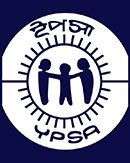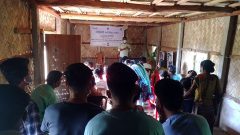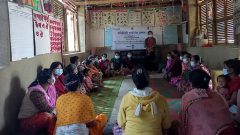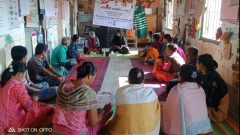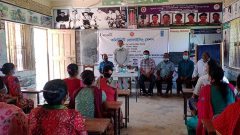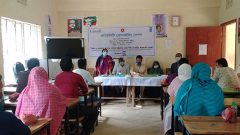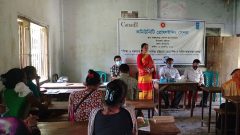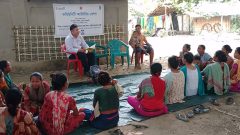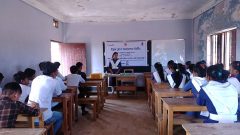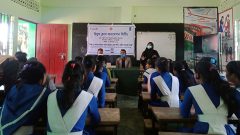Photo Gallery
(Strengthening Inclusive Development in the Chittagong Hill Tracts (SID-CHT), A Project of Ministry of CHT Affairs (MoCHTA) and UNDP)
Background
The Ministry of Chittagong Hill Tracts Affairs (MOCHTA), in collaboration with UNDP and other Development Partners has implemented several projects aiming to protecting the diversity of the Chittagong Hill Tracts (CHT) and its distinct characteristics by supporting the increased implementation of Peace Accord objectives, building capacity of devolved Regional and Hill District Councils to deliver the subjects transferred from national level and supporting confidence building and social capital strengthening in communities.
Khagrachari is one of the hill districts in Chattogram Division, situated in south eastern part of Bangladesh. It included under Chattogram Hill Tracts region and consists of 3 Paurashava, 9 Upazilas and 38 Union. Various ethnic communities and Bengali have been living in Khagrachari for ages. These communities belongs to distinct cultural identities, are also an indispensable part of the mainstream population of the country.
The women belonging to different indigenous groups are lagging behind of development in this region. Gender based violence, Violence against women and girls is one of the most insidious barriers to women’s empowerment. Where a woman suffers sexual and other forms of abuse, her capacity to work and function is severely impaired. Gender based violence is one of the biggest factors holding women and girls back across the globe. So the women of the Chittagong Hill Tracts must be included as part of the family, community, local, national, regional, and global development plans and activities in leadership and decision-making roles. Without addressing women empowerment, gender equity, gender based violence for transformative change is not possible to achieve Sustainable Development Goals (SDGs).
So for combating Gender based violence in Khagrachari Hill district, as a implementing partner of UNDP, YPSA will contribute to implement the component of “Women and Girls Empowerment in CHT through Education and skills” under the project titled “Strengthening Inclusive Development in CHT (SID-CHT 2017-21)” with the aim to strengthen socio-economic conditions of the women and girls in Khagrachari Hill district of Chittagong Hill Tracts.
Supported by : United National Development Programm (UNDP) in collaboration with MoCHTA
Funded by : Global Affairs Canada
Duration : 1st April 2021 to 30th September 2022 (18 Months)
Goal of the Project
To improve quality of education and contribute to enhanced social advancement and economic opportunities for Girls and Women in Khagrachari district.
Objectives of the project
- Improved equitable access to safe and inclusive education, with better retention of girls and adolescent girls, particularly those from ethnic minorities and with disabilities
- Improved quality of gender-responsive teaching in schools for girls, adolescent girls, and women
- Increased employability and business opportunities for adolescent girls and women, particularly those from ethnic minorities and with disabilities
Outcomes of the project
- Improved gender-empowering learning outcomes among women and girls in the conflict-affected region of the Chittagong Hill Tracts (CHT).
- Improved provision of accessible, safe and inclusive education and learning for girls and adolescent girls, particularly those from ethnic minorities and including those with disabilities, in primary and secondary levels.
- Improved provision of quality gender- and environmentally sensitive education and teaching by education actors in the CHT.
- Increased provision of gender-sensitive, demand-driven technical and vocational education and training (TVET) and recognized labour skills certification for adolescent girls and women, particularly those from ethnic minorities and including those with disabilities.
Working Area:
| SL | Name of Upzilla | Name of Union |
|---|---|---|
| 1 | Khagrachari Sadar Upzilla | Bhaibonchhara, Golabari, Kamalchhari, Khagrachhari, Perachhara |
| 2 | Mahalchari Upazila | Kayangghat, Mahalchhari, Maschhari, Mubachhari |
| 3 | Dighinala Upazila | Babuchhara, Boalkhali, Dighinala, Kabakhali, Merung |
| 4 | Panchari Upazila | Chengi, Latiban, Logang, Panchhari, Ultachari |
| 5 | Ramgarh Upazila | Pathachhara, Ramgarh |
| 6 | Laxmichari Upazila | Barmachhari, Dulyatali, Laxmichhari |
| 7 | Manikchari Upazila | Batnatali, Tintohori, Joggosala, Manikchhari |
| 8 | Matiranga Upazila | Baranala, Belchhari, Gumti, Matiranga, Tubalchhari, Taindang, Amtoli |
| 9 | Guimara Upazila | Guimara , Hafchari, Sindukchhari |
Stakeholders : Overall the stakeholders of the project are:
|
|
Project Activities:
Output: Conduct Community outreach sessions to sensitize and advocate on the importance and value of girls’ and women’s education.
- Selection of 100 communities for outreach sessions, community mobilization & prepare community profiling at School and community level
- Training of project staffs on community outreach sessions & community mobilization (2 Days)
- Conduct 400 community outreach sessions on importance and scope of girls’ education in CHT at the community level.
Output: Pocket guides to preparedness, response and recovery to gender-based violence developed and distributed among the govt. and non-govt. actors in education sector.
- Consultation workshop to finalize the contents and messages for pocket guides on GBV
- Print and distribute 500 copies of the pocket guides for raising public awareness on GBV
Output: Capacity building of GBV prevention and response provided to local stakeholders
- Conduct Training of GBV prevention/response provided to local stakeholders
- Organize QTR meeting of Prevention of Violence against Women and Children committees of Upazila level
Output: Awareness raising sessions provided to girls on their rights to education and reproductive rights.
- Conduct 100 awareness raising sessions at different schools at Upazila level on different issues menstrual hygiene management
Output: Facilitate provision of comprehensive package of support i.e. access to legal aid to 30 vulnerable GBV victims and provide GBV victims with livelihood and counselling support
- Provide support to 30 vulnerable GBV victims
Output: Dignity kits for menstrual hygiene management distributed in 100 schools and 30 adult learning centers
- Distribute 11,000 Dignity kits for menstrual hygiene management in schools and adult learning centers:
Output: Safe spaces for girls’ expression of their concerns and networking established in 300 schools.
- Site selection and provide necessary items/materials i.e. ceiling fan, chairs, tables, white boards, Floor Mat, etc. will be purchased for the Safe Space Centers.
- Formation of 100 Youth Clubs/Groups with two-third girls
- Organize 500 quarterly Meeting of Youth Group
- Organize 18 awareness Raising Activities (Film Show, Popular Staging, etc.) by Youth Club/Group
- Support to 45 drop out /most vulnerable girl students to go back to school
Output: Training and support provided to government and non-government education actors on minimum standards for education; preparedness, response, recovery, gender- based violence prevention and safe learning space in educational institutions
- Workshop on Emergency Preparedness, response and recovery to Government and non-government education actors
- Training on Emergency Preparedness, response and recovery to Government and non-government education actors. The trainer selected by the NGO will prepare training module.
- District level quarterly coordination meeting with government and non-government education actors on GBV Prevention and ensuring safe learning space for girls
- Provide well equipped first aid box to 100 schools
- Advocacy workshop at district level on disaster risk reduction inclusion in education curriculum of schools in CHT
Output: Social mobilization sessions on negative impacts of smoke from traditional cooking methods are carried out for local women’s mass awareness at Union level
- Arrange social mobilization session on negative impacts of smoke from traditional cooking methods with local women
